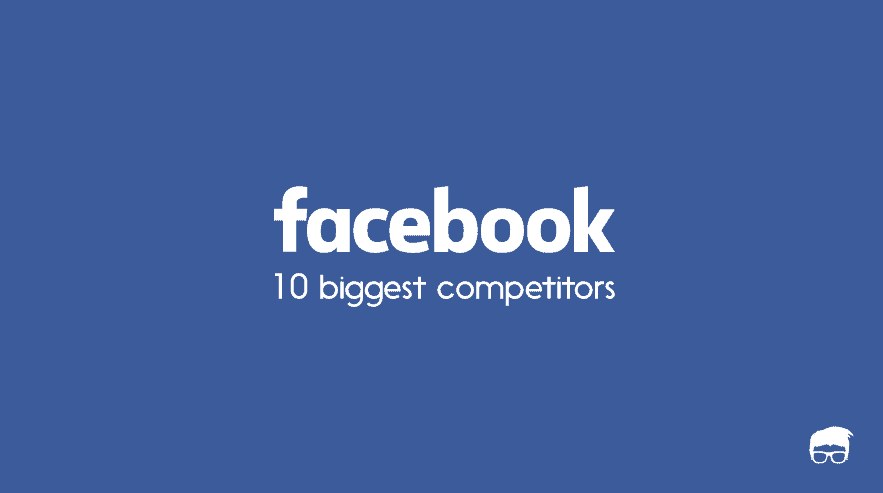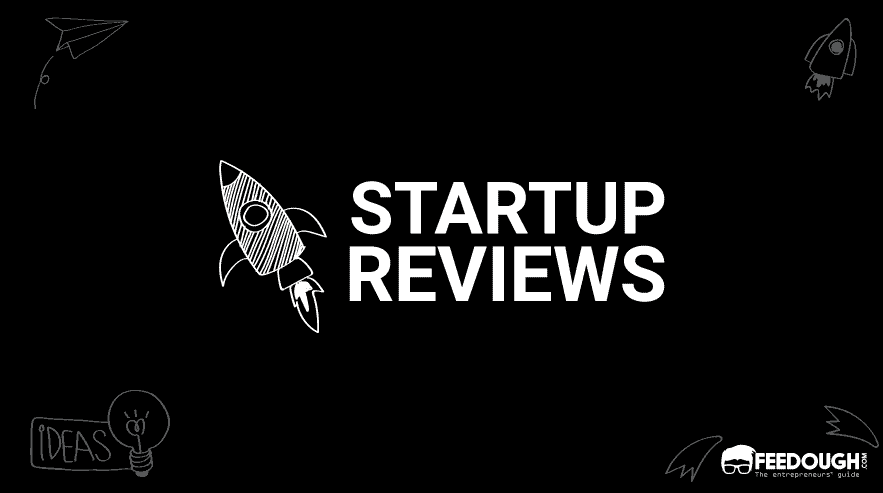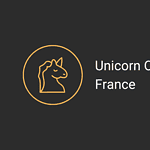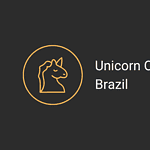Whenever we think to spend some time on social media, one name that surely comes to our mind is Facebook.
Ranked as #1 social media platform with more than 2 billion active users, Facebook is now almost synonymous to social media. It offers features like instant messaging, photo sharing, newsfeed, groups, marketplace, video sharing, etc and owns almost most of the top 5 social media networking companies including Instagram and WhatsApp.
Ever since its inception, it is known for its unique revenue model where most of its revenue comes from targeted advertisements. As per the 2017 data, the company made a revenue of 40 billion.
With increasing popularity, it also gained strong competitors. Here are some names that can give the giant a tough competition in terms of revenue and popularity.
Advertising Competitors Of Facebook
According to eMarketer, the three giants – Amazon, Google, and Facebook together occupies 70% of all digital ad dollars spent.

Google is the biggest competitor of Facebook when it comes to advertising. Together, the companies are known as the digital duopoly for dominating the advertising platform.
According to a report of 2018, Google occupies 40% while Facebook occupies 22.7% of the UK’s ad revenue share.

The largest part of Google’s revenue comes from advertising. To counterbalance Google’s AdWords, Facebook started the social media boost packages for its pages. Yet most E-commerce spending takes place on Google because of its popularity.
Besides ads, Google also introduced Orkut, Google+, Hangouts, Allo, Hello etc. to compete with Facebook and its subsidiaries when it comes to social media platforms. Even though most of them failed, Google is still one of the biggest competitors of Facebook.
Google vs Facebook
Both Google and Facebook occupy the top spots when we talk about data monetisation or targeted ads.
Mainly the two giants compete in the advertising platform. Google operates AdWords which is an auction-based ad platform that lets advertisers advertise on Google search results and its partner ads. Facebook, on the other hand, operates Facebook Ads which is a programmatic ad platform that lets advertisers buy space on Facebook and its partner websites.
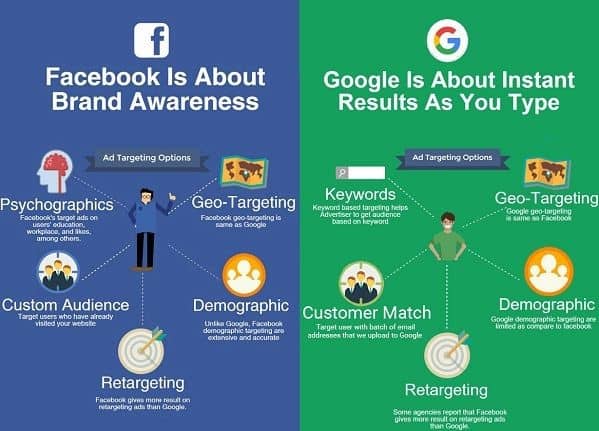
When we talk about revenues, Google surpasses Facebook by a large margin. According to Statistic.com, Google made a revenue of $209 billion in 2021 while Facebook made $114 billion.
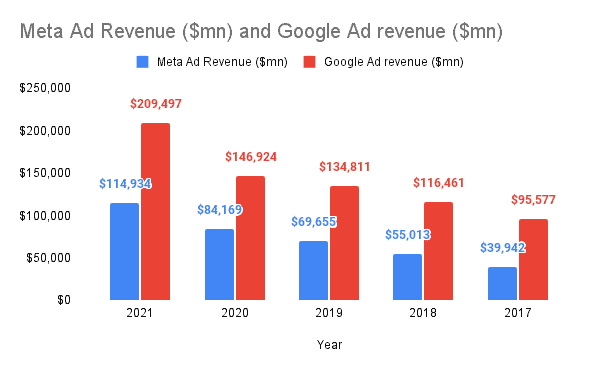
Amazon

After Google, Amazon can be considered as another tough competitor of Facebook in the advertising world. Though Amazon presently occupies 8.8% of the ads share, the percentage is predicted to increase by 10% next year.

Facebook’s market grew by 0.3% while Amazon pulled an increase of 2% within one year. Due to this shocking growth, Facebook listed Amazon in the rival list for advertisement.
Facebook vs Amazon
Amazon is very much different from Facebook when we talk about the operating model. While Facebook is a social networking platform amazon is mainly an ecommerce site.
To make a strong foothold in the ecommerce platform which can prove beneficial for increasing ad share, Facebook introduced – Facebook Marketplace. But there are a few differences between the two e-commerce sites. In Amazon, products are advertised using Amazon Sponsored Products and need to pay only when ads are clicked. Moreover, Amazon takes full responsibility for delivering the product for which they charge some delivery fees.
But on Facebook, the seller has to run ads, promote it and measure ROI. Moreover, the seller on Facebook has to take care of the shipping and delivery of their own thus not adding any additional delivery cost.
However, if we talk about the revenue model, there are many similarities. Facebook Watch competes with Amazon Prime. Also, Facebook competes with Amazon when it comes to wooing retailers and ecommerce sellers to advertise on the platform.
Facebook’s Competitors According To User-Base
Facebook isn’t the only website when it comes to social media networking. It shares its user-base with the following competitors.
TikTok

TikTok was launched in 2017, but just in one year, its user base rose by 700 million, thanks to its heavy investment in influencer marketing. Not only that, TikTok is embracing a unique strategy to enter the competition head-on. It bought Musical.ly in 2017. Since 2018, it started poaching the ex-Facebook employees with a 20% higher salary than Facebook.
Today, TikTok is one of the biggest competitors of Facebook. In fact, it has more than 1.2 billion monthly active users, and its user base is growing by the day.
Facebook, to tackle the same, launched Reels on Instagram and its own platform. But the company is still losing ground to TikTok in terms of the user base.
Facebook vs TikTok
If we talk about stats, If we talk about stats, TikTok is surely dominating Facebook when it comes to Generation Z as the target audience (41% of TikTok users are aged between 16 and 24). It surely understood the habits and preferences of this age group better than Facebook.
As a result?
TikTok has outperformed Facebook when it comes to getting more attention per user. An average user spends just 43 minutes on Facebook and 52 minutes a day on TikTok.
Moreover-
TikTok gained huge popularity in video making due to its powerful camera tools- Pride, Face Filters 3D Mask, AR. Compared to these, Facebook’s features are limited and the users often have to resort to other editing apps to get the best of Reels. However, with the introduction of Reels templates, the platform has added ease of use to it.
Moreover, Gen Z prefers TikTok’s algorithm to Facebook’s. They don’t like Facebook’s algorithm which shows their friends’ posts in chronological order. On the other hand, TikTok’s algorithm is much more personalised.
To be fair, Facebook is trying to improve its algorithms. But, it still needs to catch up with TikTok.

Twitter too competes with Facebook when it comes to users and their engagement.
As estimated in July 2019, Facebook is still leading the game with 2.38B monthly active users, while Twitter was ranked 12th with 330 million users.
Even though user difference is huge, but Facebook faces tough competition because Twitter is gaining popularity for transmitting messages in live events among the millennials.
Facebook vs Twitter
If compared by features and goals, Twitter is very different from Facebook.
Facebook connects people where one can write a post of unlimited characters. Users can make “friends”, like and share the post of their choice which remains evergreen. Even they can message instantly and play games on Facebook.
While Twitter connects ideas and interest. Users can “follow” others, can find the latest trending news. They can tweet and retweet their response but it is limited to 280 characters only. But due to constant real-time interaction, the contents have a short lifespan.
But Facebook’s revenue model is a lot similar to Twitter’s and both compete for getting as much user attention and as many ads as they can.

It is considered the fastest-growing platform in history which reached 10 million new visitors in a month. In August 2019, Pinterest reached 291M monthly active users and there’s no looking back considering that no one is able to tackle it with its disruptive business model.
Moreover, Pinterest drives a huge amount of referral traffic to business websites. So, it is preferred by global marketers for different marketing purposes making it one of the competitors of Facebook.
Pinterest vs Facebook
Facebook and Pinterest are different in terms of their operating model. While Facebook’s focus is to become a one-stop social networking platform where people connect and chat, Pinterest focuses on making it easy to discover, save, and share information using photos, videos, and links.
Facebook users can create small groups of friends with a common interest, can chat and share information with them. But Pinterest does not allow groups. Only a user can follow other users and see their pins in own News Feed.
Snapchat

Snapchat is a big competitor to Facebook and its subsidiaries like Messenger and Instagram when it comes to instant messaging and photo and video sharing. It is considered as one of the fastest-growing social platforms with over 203 million daily active users (2019). This application, just like Tik Tok, is more popular among Generation Z (current teenagers).
The estimated number of videos viewed and shared daily on the platform is 10 billion.
Snapchat vs Facebook
The Snapchat vs Facebook debate has been going on ever since Snapchat said no to being acquired by FB. Facebook, since then, has successfully been able to copy most of the features from the original application and added the feature of stories, instant photo messages, etc, to Instagram, Messenger, and WhatsApp, making their business models similar to Snapchat’s business model.

LinkedIn has a huge user base of more than 645M users from all over the world making it one of the most popular platforms for hiring employers or finding jobs. It competes with Facebook’s in terms of popularity among the professional crowd.
LinkedIn vs Facebook
LinkedIn and Facebook are very much different from each other. The former is a business platform that offers profiles and networks to create engagement among professionals, while the latter helps to connect with “friends”. But both compete with each other when it comes to getting the most attention of the users and getting most ads from advertisers.
Moreover, with the launch of Jobs on Facebook, Facebook has made LinkedIn its direct competitor.
Facebook’s Competitors In Video-Sharing Industry
Facebook isn’t limited to the usual social networking websites. The company, with its offering – Facebook Watch, is a known contender when it comes to video hosting and video sharing and is actively competing with giants like YouTube, Prime, etc.
YouTube

YouTube competes with Facebook for video-sharing. It is considered as the second largest search engine after Google and the present number of active users is 2 billion making the app one of the toughest competitors of Facebook.
To compete with YouTube, Facebook launched Facebook Watch in 2017 which presently witnesses 720M users per month.
Facebook vs YouTube
Though both platforms allow video sharing, yet they are very different from each other in terms of functioning.
YouTube offers a longer shelf-life to the videos than Watch. Google’s platform uses Google-like ranking features which involves uploaders to employ search engine optimisation of their videos. Moreover, videos on Youtube range from varied categories.
Facebook, however, uses its own social-media like algorithm to present videos to its users and hence the shelf-life of such videos aren’t much compared to that on Youtube. The platform also focuses on community-focused ‘shows’ rather than one or two videos from independent publishers
Moreover, the way the company defines “view” is also different. To count as “view”, the YouTube videos need to get actual click on them (auto-played videos don’t get views). Even for the YouTube ads, they need to be played for 30 secs to get a “view”. While Facebook considers a video to get “view” even if the video is auto-played and being played for 3 seconds.
Facebook’s Competitors In Different Countries
Even though Facebook dominates the world when it comes to social networking, there are still many countries that it couldn’t conquer. Following are some of the competitors of Facebook when it comes to regions.

WeChat is a social media ecosystem of China. By ecosystem we mean, it is just like Facebook with added features. You can order food, send and receive money, shop, pay utility bills and check-in for flights using just one application.
It is something Facebook aspires to be in the long run. Hence, it is considered to be a big competition for Facebook as WeChat already has over 1 Billion active users all over the world.
WeChat vs Facebook
WeChat is the only platform which has more features than Facebook. It offers social media features like “Moments” (like Facebook’s Wall) and “People Nearby”. But besides that, it also provides its users with news and entertainment articles, acts as an eCommerce platform and even has the ability to host mini-programs (apps within the apps, like games) which Facebook app lacks.
VKontakte

VKontakte (VK) shares very similar features and have the same goals as Facebook. It can be considered as Facebook of Russia because of its similarities and its dominance over the Russian market.
VK is ranked as the second most popular social platform in Russia with more than 300M registered users and 85M active users. In comparison, Facebook has around 8M active users.
VK vs Facebook
Though VK features are much similar to Facebook, Facebook still holds more popularity all over the world.
When it comes to account security, VK fails to meet the criteria. As a result around 100 million VK accounts were hacked and personal information is published in the Dark Web. While Facebook’s accounts are nearly impossible to hack.
Facebook allows users to add profiles and details about his life as much as they feel necessary. While in VK, more detailed information is needed which can be easily viewed by the people from the same school or with the same interest, birthplace, etc.
Another difference is the feature of listening and sharing music. VK allows the user to listen and save the music offline from around the world, which is not possible on Facebook.
Let’s wrap up
Facebook, though gained world-wide popularity, still strives to make itself better by regularly updating with new features. At every step, it proves itself to be a tough competitor who keeps the ability to dominate the market.
Go On, Tell Us What You Think!
Did we miss something? Come on! Tell us what you think about our article on Facebook’s competitors in the comments section
Reading has always been my hobby but writing has become my passion. I love to try and learn new things with great interest
